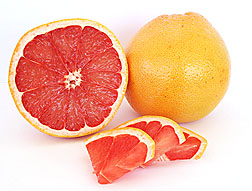This page has been archived and is being provided for reference purposes only. The page is no longer being updated, and therefore, links on the page may be invalid.
|
|
|
|
Fungi May Hold Key to Reducing Grapefruit Juice Interactions with Medications
By Sharon DurhamNovember 16, 2009
A fungus may help solve a problem of a grapefruit compound that interacts negatively with certain prescription drugs, according to studies by Agricultural Research Service (ARS) scientists.
Grapefruit contains furanocomarins (FCs), which inhibit the enzymatic activity responsible for metabolizing certain prescribed medications and allowing more of the medication to enter the bloodstream. FCs are phytochemicals commonly found in plants. Two well-known phytochemicals are Vitamins C and E.
Grapefruit juice can interfere with the metabolism of certain medications used to treat a wide range of conditions such as allergies, abnormal heart rhythm, depression, hypertension, infections, heart disease, and high cholesterol. The grapefruit industry may have lost customers who no longer drink grapefruit juice due to their medications.
ARS chemists Kyung Myung and John Manthey and microbiologist Jan Narciso at the ARS Citrus and Subtropical Products Laboratory in Winter Haven, Fla., began the study using a fungus—Aspergillus niger—to bind and break down FCs in grapefruit juice.
Grapefruit juice contains three main FCs. Myung found that A. niger either bound these FCs or enzymatically broke them down into other products. Enzymatic inactivation of these compounds may be a means of eliminating them from commercial grapefruit juice, and work to identify these enzymes in A. niger is in progress. A. niger is one of the most common species of the genus Aspergillus that can cause black mold on certain fruits and vegetables but often doesn’t cause human disease.
Myung and his team decided to also test edible fungi, or mushrooms. In studies, they found that edible mushrooms such as morels, oyster and button mushrooms—when dried, pulverized and added to grapefruit juice—also removed FCs. That provides researchers with evidence that fungal proteins could be responsible for removing the FCs from the grapefruit juice.
This research was published in the Journal of Applied Microbiology and Biotechnology and theJournal of Agricultural and Food Chemistry.
ARS is the principal intramural scientific research agency in the U.S. Department of Agriculture.

